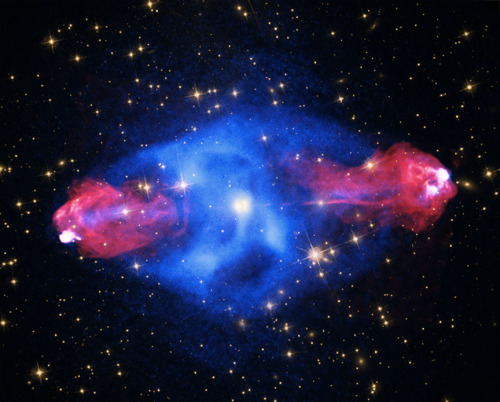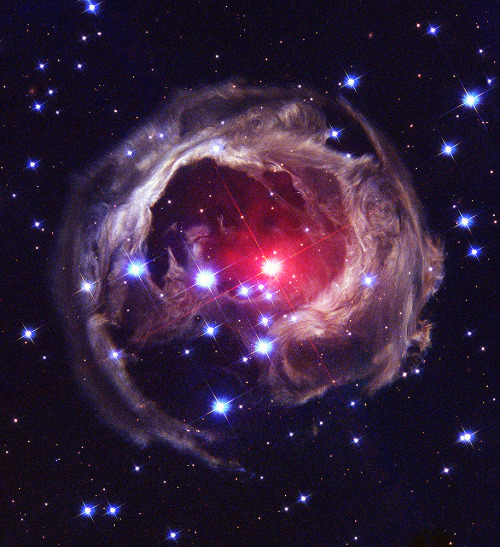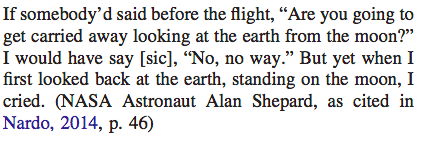A Gallery Of ‘Tadpole Galaxies’

A Gallery of ‘Tadpole Galaxies’
These postage-stamp-size images reveal 36 young galaxies caught in the act of merging with other galaxies. These galaxies appear as they existed many billions of years ago. Astronomers have dubbed them “tadpole galaxies” because of their distinct knot-and-tail shapes, which suggest that they are engaging in galactic mergers.
Credit: NASA, A. Straughn, S. Cohen, and R. Windhorst (Arizona State University), and the HUDF team (Space Telescope Science Institute) Source: http://www.spacetelescope.org/images/opo0604a/
More Posts from Xnzda and Others

Light from Cygnus A: Celebrating astronomy in this International Year of Light, the detailed image reveals spectacular active galaxy Cygnus A in light across the electromagnetic spectrum. Incorporating X-ray data extends to either side along the same axis for nearly 300,000 light-years powered by jets of relativistic particles emanating from the galaxys central supermassive black hole. Hot spots likely mark the ends of the jets impacting surrounding cool, dense material. Confined to yellow hues, optical wavelength data of the galaxy from Hubble and the surrounding field in the Digital Sky Survey complete a remarkable multiwavelength view. via NASA
js

M94: Bursting With Stars
Located about 16 million light-years away, this new Hubble image shows the sparkling galaxy Messier 94. You’ll notice the bright ring (or starburst ring) around Messier 94 where new stars are forming at a high rate. The cause of this star-forming region is thought to be a pressure wave going outwards from the galactic center, compressing the gas and dust in the outer region. The compression of material means the gas starts to collapse into denser clouds. Inside these dense clouds, gravity pulls the gas and dust together until temperature and pressure are high enough for stars to be born. (Image credit: NASA / ESA / Hubble)

Light Echoes from V838 Mon
For reasons unknown, star V838 Mon’s outer surface suddenly greatly expanded with the result that it became the brightest star in the entire Milky Way Galaxy in January 2002. Then, just as suddenly, it faded. A stellar flash like this has never been seen before.
It’s true that supernovae and novae expel matter out into space. But while the V838 Mon flash appears to expel material into space, what is seen here is actually an outwardly moving light echo of the bright flash. In a light echo, light from the flash is reflected by successively more distant rings in the ambient interstellar dust that already surrounded the star.
V838 Mon lies about 20,000 light years away toward the constellation of Monoceros the unicorn. In this Hubble Space Telescope image from February 2004, the light echo is about six light years in diameter.
Image Credit: NASA, APOD, ESA, H. E. Bond (STScI)


Astronauts talking about viewing the earth from the moon, from The Overview Effect: Awe and Self-Transcendent Experience in Space Flight

A stellar fingerprint - an emission-line star known as IRAS 12196-6300
js

Hoag’s Object Hoag’s Object is a non typical galaxy of a type known as a ring galaxy. It is a nearly perfect ring of hot blue stars which circle around the yellow nucleus of this ring galaxy. The galaxy is approximately 600 million light years away from the constellation Serpens. Image credit: NASA
What Happened to Mars?
Billions of years ago, Mars was a very different world. Liquid water flowed in long rivers that emptied into lakes and shallow seas. A thick atmosphere blanketed the planet and kept it warm.

Today, Mars is bitter cold. The Red Planet’s thin and wispy atmosphere provides scant cover for the surface below.

Our MAVEN Mission
The Mars Atmosphere and Volatile EvolutioN (MAVEN) mission is part of our Mars Scout program. This spacecraft launched in November 2013, and is exploring the Red Planet’s upper atmosphere, ionosphere and interactions with the sun and solar wind.

The purpose of the MAVEN mission is to determine the state of the upper atmosphere of Mars, the processes that control it and the overall atmospheric loss that is currently occurring. Specifically, MAVEN is exploring the processes through which the top of the Martian atmosphere can be lost to space. Scientists think that this loss could be important in explaining the changes in the climate of Mars that have occurred over the last four billion years.
New Findings
Today, Nov. 5, we will share new details of key science findings from our ongoing exploration of Mars during a news briefing at 2 p.m. EDT. This event will be broadcast live on NASA Television. Have questions? Use #askNASA during the briefing.
Make sure to follow us on Tumblr for your regular dose of space: http://nasa.tumblr.com
-
 xnzda reblogged this · 5 years ago
xnzda reblogged this · 5 years ago -
 iamwhatismissing reblogged this · 8 years ago
iamwhatismissing reblogged this · 8 years ago -
 hardcodeddead reblogged this · 9 years ago
hardcodeddead reblogged this · 9 years ago -
 pixelated-entropy reblogged this · 9 years ago
pixelated-entropy reblogged this · 9 years ago -
 beastboy826 liked this · 9 years ago
beastboy826 liked this · 9 years ago -
 paranormal-xfiles reblogged this · 9 years ago
paranormal-xfiles reblogged this · 9 years ago -
 zombimanos reblogged this · 9 years ago
zombimanos reblogged this · 9 years ago -
 your-so-cool reblogged this · 9 years ago
your-so-cool reblogged this · 9 years ago -
 your-so-cool liked this · 9 years ago
your-so-cool liked this · 9 years ago -
 mini-space-alien-blog reblogged this · 9 years ago
mini-space-alien-blog reblogged this · 9 years ago -
 galaxyamaze reblogged this · 9 years ago
galaxyamaze reblogged this · 9 years ago -
 timeunraveller reblogged this · 10 years ago
timeunraveller reblogged this · 10 years ago -
 sauntersvaguelydownwards reblogged this · 10 years ago
sauntersvaguelydownwards reblogged this · 10 years ago -
 5mmgridbook liked this · 10 years ago
5mmgridbook liked this · 10 years ago -
 romo-sagan reblogged this · 10 years ago
romo-sagan reblogged this · 10 years ago -
 lordevren reblogged this · 10 years ago
lordevren reblogged this · 10 years ago -
 clarevoience reblogged this · 10 years ago
clarevoience reblogged this · 10 years ago -
 kindofspacey reblogged this · 10 years ago
kindofspacey reblogged this · 10 years ago -
 kindofspacey liked this · 10 years ago
kindofspacey liked this · 10 years ago -
 or-was-i-up-all-night reblogged this · 10 years ago
or-was-i-up-all-night reblogged this · 10 years ago -
 starquack-blog reblogged this · 10 years ago
starquack-blog reblogged this · 10 years ago -
 kidkenner reblogged this · 10 years ago
kidkenner reblogged this · 10 years ago -
 smwke-blog reblogged this · 10 years ago
smwke-blog reblogged this · 10 years ago -
 zetarays reblogged this · 10 years ago
zetarays reblogged this · 10 years ago -
 quantadictory-blog reblogged this · 10 years ago
quantadictory-blog reblogged this · 10 years ago -
 fuckyeahcelestialthings reblogged this · 10 years ago
fuckyeahcelestialthings reblogged this · 10 years ago -
 brightestofcentaurus reblogged this · 10 years ago
brightestofcentaurus reblogged this · 10 years ago -
 letsfuckingtalkaboutspace reblogged this · 10 years ago
letsfuckingtalkaboutspace reblogged this · 10 years ago -
 blungren reblogged this · 10 years ago
blungren reblogged this · 10 years ago -
 blungren liked this · 10 years ago
blungren liked this · 10 years ago -
 princesseldaa reblogged this · 10 years ago
princesseldaa reblogged this · 10 years ago -
 fallenangellostfeathers reblogged this · 10 years ago
fallenangellostfeathers reblogged this · 10 years ago -
 fallenangellostfeathers liked this · 10 years ago
fallenangellostfeathers liked this · 10 years ago -
 chocorica reblogged this · 10 years ago
chocorica reblogged this · 10 years ago -
 chocorica liked this · 10 years ago
chocorica liked this · 10 years ago -
 showmetoashipwreck liked this · 10 years ago
showmetoashipwreck liked this · 10 years ago -
 hateleybash reblogged this · 10 years ago
hateleybash reblogged this · 10 years ago -
 jayspeakswords reblogged this · 10 years ago
jayspeakswords reblogged this · 10 years ago









